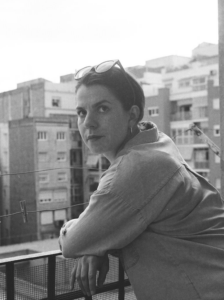By MONA KAREEM
Translated from the Arabic by SARA ELKAMEL
Reviewed by SUMMER FARAH

My first encounter with Mona Kareem’s work was not her poetry, but her essay in Poetry Birmingham on the trend of Western poets “translating” from languages they are not literate in. Kareem brings attention to what she calls the “colonial phenomenon of rendition as translation,” in which a poet effectively workshops a rough translation done by a native speaker or someone who is otherwise literate in the original language. Often, this is the only way acclaimed writers reach Western audiences. I was excited, then, to see that I Will Not Fold These Maps, Kareem’s first collection translated to English, defies this trend. Presented with the original Arabic alongside the English translated by Egyptian poet and journalist Sara Elkamel—for whom this work is a debut full-length translation—this book is a mixture of Kareem’s previously collected work alongside brand new poems, presenting a great overview of her work. I Will Not Fold These Maps’s execution as a collaboration between Arab poet-translators only strengthens the experience of reading it, filled with poems that vividly explore exile, grief, and writing and its relationship to resistance.














